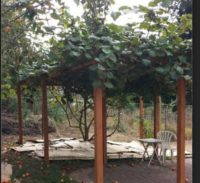By Donna Westfall, October 1, 2018 – Two fantastic opportunities came up last week. First, Roots & Shoots Gardening Club arranged to visit gardens and greenhouses around our area for the last meeting of the year. The club meets the third Wednesday of the month generally starting at 11 am. Their meetings start in January and run through October. There are no dues or requirements although a love of gardening helps. Contact inf:o President—Mary Anne Buckles, email: mabuckles2@hotmail.com, Tel: 562-533-4810
Four homes were on the gardening tour. One in the city and three in the County. Some of the things we saw: array of gorgeous flowers of all varieties and sizes, three foot long squash, mum’s the size of wheelbarrows, greenhouses with the reddest tomatoes you’d ever want to see, old tires used to grow produce, square foot gardening and more.
Then, on Saturday, September 29th, a couple who have been practicing permaculture for the past four years, opened their one acre parcel in Ft. Dick for a tour and to teach us about Permaculture. A day that was extremely worthwhile.
 The workshop was arranged to cover the 12 principles of Permaculture. Dave Salmon, Dan Schultz and Terry Allaway, each covered four separate principles.
The workshop was arranged to cover the 12 principles of Permaculture. Dave Salmon, Dan Schultz and Terry Allaway, each covered four separate principles.
The first principle: Observe and interact: Think about your design plan by taking these into consideration: climate, topography, water, soils, vegetation, wildlife, wind, fire and people. I learned that putting down three layers of cardboard will control weeds. It also insulates the ground to a temperature that kills weeds. All these years I’ve dug, rototilled and hand weeded. Now, I’m out to secure cardboard, lots of cardboard.
In the first picture, they built a pergola, then trained kiwi vines to cover it. The vines create shade and produce fruit, hundreds of kiwi’s. Additionally, their hammock hangs underneath creating a restful location to enjoy the summer weather. Notice all the cardboard underneath?
Principle #5: Use and value renewable resources and services: David Salmon found a free source of old redwood fencing in which to construct an outdoor sink and potting table. The sink is connected by hose to their water source. How often I’ve wanted water on the other side of the garden and could smack my forehead for not thinking of something like this:
If ever another free workshop is offered, I highly suggest signing up.
For information, books by Bill Mollison and David Holmgren will further your knowledge.



Just a note to garden enthusiasts: you may not be aware that your local Department of Agriculture offers pest identification services. You can bring down any pests or weeds that bugging you, or bring down a diseased plant for analysis. If we can’t figure out whats going we can send it down to the California Department of Food and Agriculture lab for identification. These services are at no cost to you (other than the taxes you already pay of course). If you want to talk myself or our biologist Chelsea in person please call to make sure somebody will be here first before coming down (we work in the field quite a bit). Insect samples should be brought in a clean bag or jar. Plant samples should be brought in Monday through Wednesday so we can get them to the lab fresh if we need to send them. You can contact us at 707-464-7235 and we’re at 2650 Washington Blvd in Crescent City.